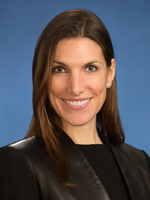Managing Director, Goldman Sachs
New York, NY
Member, Pratt Board of Visitors
A 2002 Duke graduate who double-majored in biomedical and electrical and engineering, Alyssa Benza is now a managing director at Goldman Sachs—and stays tied to her alma mater by serving on Pratt’s Board of Visitors.
What do you do at Goldman Sachs?
I oversee a group that works with clients who own hedge funds. We help them with anything they might need regarding interest rates and foreign exchange products, whether it be providing market information, executing trades or providing access to our research. We deliver our firm’s services to clients who do not have expertise in interest rates or foreign exchange and help them either hedge their portfolio or create alpha—meaning uncorrelated profits—to their core strategies and investments.
And how does an engineering degree from Duke translate to your profession?
Actually, nothing I was taught in a classroom or the laboratory is directly transferrable to my current career. But getting good grades while double majoring in two engineering programs as difficult and prestigious as Duke’s got my foot in the door. I could have taken economics or finance classes at other schools, but I’m not sure I would have felt much more prepared. Trading is not something you learn in school.
So if not with the subject matter, how did your time at Duke help you prepare for a career on Wall Street?
Walking into the door with an engineering degree from Duke made others give me the benefit of the doubt that I was smart and could solve problems. It helped me build credibility instantly with anyone who looked at my resume. I think I could have gotten where I am with a liberal arts degree, for example, but it would have taken me a lot longer to prove myself. And then there’s the network. There are a surprisingly large number of Duke engineers on Wall Street who are close-knit and who have respect for and watch out for one another.
"Walking into the door with an engineering degree from Duke made others give me the benefit of the doubt that I was smart and could solve problems."
How did you get to Goldman Sachs from Duke's engineering school?
I knew after my junior year that I didn’t want to do research or work in a laboratory. Your typical engineering career just wasn’t the right path for me. Another Duke alum and a friend of mine at Goldman Sachs at the time convinced me to interview for an internship there that summer. Somehow I got the job, and I’ve been here ever since.
It might not seem like it, but there are actually a lot of similarities between the people here and my friends at Duke, and that really resonated with me. There are a lot of intelligent people with a ton to offer in many different areas of expertise. I took this opportunity because it had an extremely steep learning curve and I knew that I wouldn’t be bored. Plus, even if I didn’t love the first job, there were a lot of other opportunities within the company.
How can students today help put themselves in position to succeed after graduation?
If students are lucky enough to know what they want, they can work hard the first few years and it will pay off. There’s no doubt about that. I had a phenomenal senior year partly because I already had a job lined up from busting my tail for the first three years.
But it’s not all about work. The social aspect of Duke’s campus is just as important, in my opinion. You can be as social or as studious as you want and switch gears from one day to the next. As a 34-year-old on Wall Street, I still find a lot of people I met more than 10 years ago who still help me in a number of ways.
Why should students consider an ECE degree today?
There are a lot of great teachers for starters, but most of all it gives optionality, especially in today’s world. With the tech world and social media exploding, a lot of places are desperate for techies and coders. There’s just so much demand. And although it’s very difficult and there’s no way you can get through it without a lot of hard work, employers know that and the degree will get you a long way in a lot of industries.

